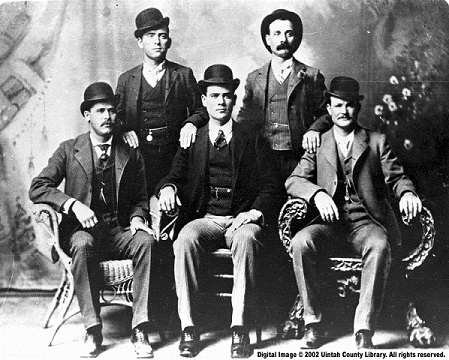Dublin Core
Title
Description
As Americans, we extol the value of an “honest living,” but what about work that is less than honest? Butch Cassidy was a Utah boy with a penchant for wild living who paid his way using any means necessary.
While considered unsavory, many Americans actually make their living through less-than-legal means. Butch Cassidy is perhaps Utah’s most notorious – and beloved – outlaw, whose romantic reputation as a “Robin Hood of the West” complicates our ideas about the value of an “honest living.”
Cassidy grew up working on ranches around his hometown of Circleville, Utah. When his father lost their property, Cassidy turned to cattle rustling and minor run-ins with the law. But his first big bank robbery in Telluride in 1889 set him firmly on the Outlaw Trail, a scattered route of hideouts and ranches that offered jobs to bandits on the run.
But Butch Cassidy wasn’t a criminal for the sake of crime. He bristled at large cattle operations taking advantage of tough times to force small ranchers out of business. He once said of his work that, “The best way to hurt them is through their pocketbook… I steal their money just to hear them holler. Then I pass it out among those who really need it.” Cassidy and his Wild Bunch gang held up banks and trains to help farmers who couldn’t pay their bills. He became a folk hero known for putting his stolen money to good use and his popularity enabled him to evade law enforcement with the help of locals.
Cassidy was notoriously friendly, but robbing was his business, and he took his trade seriously. Despite his generosity, his Robin Hood image is tarnished. In 1897, Cassidy robbed the Pleasant Valley Coal Company payroll at Castle Gate, essentially stealing from the pockets of working-class miners. Later that year, the Wild Bunch robbed a vegetable peddler near Huntington - hardly a wealthy cattle or railroad baron.
So, was Butch Cassidy truly an outlaw for the people? Whatever the answer, it’s clear that the Robin Hood stories that make up his legend do show that robbing trains and banks to help the small communities of Utah was valuable – and certainly memorable – work.
Creator
Mikee Ferran for Utah Humanities © 2017
Source
_______________
See Linda King Newell and Vivian Linford Talbot, “The Myths and Legends of Butch Cassidy,” from The History of Garfield County, Salt Lake City: Utah State Historical Society, 1998, from History to Go website; Charles Kelly, The Outlaw Trail: A History of Butch Cassidy and his Wild Bunch, Lincoln: University of Nebraska Press, 1996; “Desperadoes at Castle Gate,” The Salt Lake Herald, April 22, 1897; “Butch Cassiday’s Gang,” The Salt Lake Herald, May 28, 1897; Shane Burrows, “Butch Cassidy,” Town of Circleville website; according to Utah.com’s article on Butch Cassidy, his full quote about his outlaw motivations reads: “The best way to hurt them is through their pocketbook. They will holler louder than if you cut off both legs. I steal their money just to hear them holler. Then I pass it out among those who really need it.”

